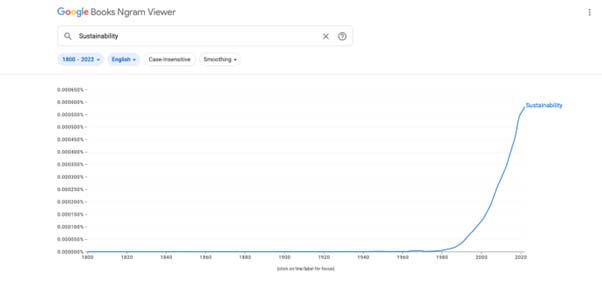Did you know that consumers today concern themselves with how sustainable your products and services are before purchasing them?
According to a 2021 study by Simon-Kutcher & Partners, around 63% of consumers have made a modest to significant shift towards being more sustainable in the past five years. This number includes consumers who have made minor changes. Furthermore, 85% of them have become greener in purchasing decisions.
Sustainability is no longer a buzzword or a passing ignorable trend. It is a firm consumer demand.
Interestingly, the popularity of the word- sustainability lends some insights into its steady rise in importance to consumers.
According to Google Ngram Viewer, sustainability first saw an increase in usage in the 1960s, with a slight decrease in the 1970s. However, it has since been on a steady incline from the 1980s, through the turn of the new millennium, and into the 2020s, highlighting its consistent growth in significance to the people.
We know that consumers do not only buy products; they buy into values. Therefore, in a marketplace where the customer is king, businesses that fail to align themselves with sustainable practices risk being left behind.

But don’t just take our word for it.
A 2023 study conducted by McKinsey and NielsenIQ revealed that products marketed as sustainable grew 2.7 times faster than other products.
Today, sustainable branding goes beyond goodwill for the planet. It is a strategic approach that builds trust, fosters brand loyalty, enhances success and elevates brand reputation.
So, how can embracing green initiatives promote long-term success? Here are a few reasons why Dolphin Branding defaults to sustainability when crafting your brand story, narrative and tone.
Trust and Credibility
Businesses build credibility when they transparently share their efforts to be more sustainable. Efforts include sourcing ethically, publicising their green certifications, taking measures to reduce their carbon footprint and implementing Corporate Social Responsibility (CSR) initiatives. A consistent commitment to sustainability reassures consumers that the brand values align with their own, fostering deeper connections, boosting trust and credibility, and encouraging long-term loyalty.
Attracting Eco-Conscious Consumers
As concerns around climate change, the ecology of the earth, and pollution increase, consumers have become increasingly selective. The same 2021 study conducted by Simon-Kutcher & Partners revealed that 34% of consumers are willing to pay more for brands whose mode of production aligns with sustainable values. By embracing green practices, brands attract and retain customers who appreciate their ethical commitment to conserving the planet.
Encouraging Creativity, Innovation and Technology
Sustainable branding requires thinking through alternative and eco-conscious answers to problems. This forces businesses to employ all the creativity, innovation and new technologies at their disposal, often leading them to find better cost-efficient solutions that are more profitable. In fact, sustainability-driven innovation differentiates a brand, creating new market opportunities and giving it a competitive advantage over other brands.
Meeting Government Regulations, Investor and Internal Stakeholder Expectations
Governments and international governing bodies are increasingly implementing stricter regulations on corporations to minimise ecological damage. Adopting sustainable solutions allows businesses to meet the compliance requirements and the demands set out by these regulations. Additionally, investors are progressively looking to invest in companies that seriously consider ESG or Environmental, Social, and Governance factors in their business proposals. Sustainability efforts also influence internal stakeholders such as employees. A strong commitment to sustainability boosts company morale, inspires action and enhances employee engagement. As with consumption, people are increasingly looking to work for companies that align with their values.
Business Resilience
Implementing sustainable modes of production builds resilience against resource scarcity and climate change. These practices build stable businesses that are future proofed to ensure longevity, adaptability, and resilience in a dynamic marketplace.
Today, consumers, employees, and investors prioritise brands that take meaningful steps toward sustainability. By integrating eco-friendly actions into your brand strategy, you create a responsible brand that is future proof, admired, and trusted. No matter where you are in your brand journey, implementing eco-conscious practices will set you apart, give you a competitive edge and ensure long-term success.
The future of branding is green—are you ready to take that step?



Comments are closed